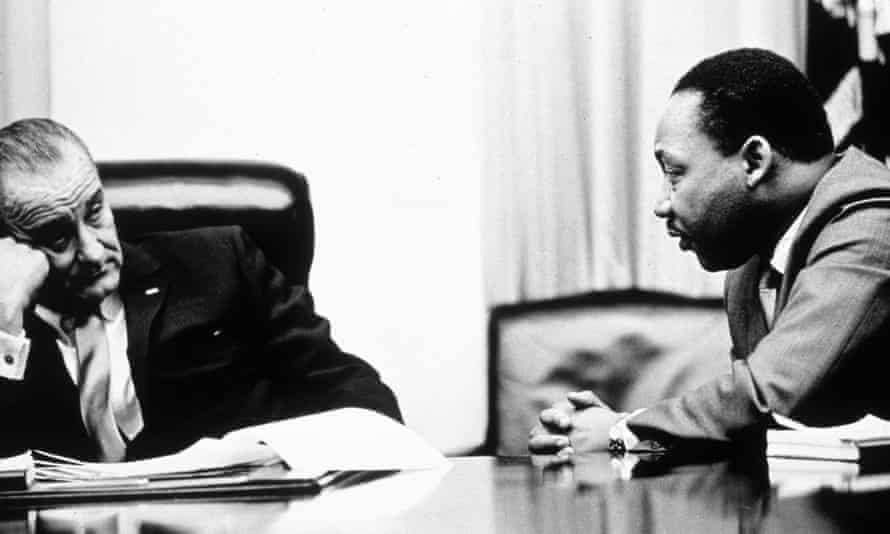Fight to vote: activism works – just look at the 1965 Voting Rights Act
“Martin Luther King Jr and Lyndon B Johnson’s telegrams underscore just how significantly Selma changed the calculus on pushing voting rights legislation

Last modified on Thu 18 Feb 2021 15.42 EST
Sign up for the Guardian's Fight to Vote newsletter
Happy Thursday,
This week, midway through Black History Month, I wanted to open up the archives and look at some of the history that helped shape the Voting Rights Act, the powerful 1965 law that offered some of the most significant protections for voting rights in US history. As I’ve covered the struggle over voting rights over the last several years, and amid a push for sweeping new federal voting protections, I’ve often found myself turning back to the fight over the act to understand how efforts to restrict the vote today mirror what has occurred before.
I was struck recently by these two telegrams, exchanged days apart in March 1965, between Martin Luther King Jr and Lyndon B Johnson. King sent the telegram the morning after Johnson gave a speech to Congress introducing the law – a speech that has since been described as one of the greatest speeches by a sitting US president.
The horrific images of Bloody Sunday – the 7 March 1965 voting rights march in Selma, Alabama, where law enforcement brutally beat protesters as they demonstrated for voting rights – had galvanized the country, and Johnson, to move quickly to embrace the legislation.
In his speech, Johnson linked what had happened in Selma to some of the most well-known battles in US history, tying the struggle for voting rights to the historical battle for American freedom.
“At times history and fate meet at a single time, in a single place, to shape a turning point in man’s unending search for freedom. So it was at Lexington and Concord. So it was a century ago at Appomattox. So it was last week in Selma, Alabama,” Johnson opened his speech.
King praised Johnson’s speech.
“Your speech to the joint session of Congress last night was the most moving eloquent unequivocal and passionate plea for human rights ever made by any president of this nation,” King wrote from Selma. “You evidenced amazing understanding of the depth and dimensions of the problems that we face in our struggle, your tone was sincere throughout and your persuasive power never more forceful.”
Days later, Johnson wrote back, saying he appreciated the comments from the civil rights leader.
“I sincerely believe the that the mood of the country and the Congress offers us an opportunity to secure legislation which will provide a direct, quick, effective and constitutional means of ensuring all citizens will be able to register and vote,” he wrote. “I fully appreciate the pressures and tensions under which you are laboring and I am confident you will continue to offer a course of leadership that will permit us to move towards our goal of universal suffrage.”
The telegrams underscore just how significantly Selma had changed the calculus on pushing voting rights legislation. In a 2015 essay, Julian Zelizer, a historian at Princeton University, wrote that Johnson was hesitant about moving the bill so early in the year, as King and other civil rights leaders pressured him to move quickly. In choosing to give the speech after Selma, Johnson signaled he was embracing the activists. It was an example of how activism can work.
“Delivering that speech was a courageous decision,” he wrote. “Despite strong opposition in Washington to the federal government committing itself to the protection of African American voters, Johnson delivered a powerful speech that left no doubt of where he stood in this debate,” he wrote.
Less than five months after the telegram, Johnson signed the Voting Rights Act into law.
Also worth watching …
Georgia advanced two measures in the state legislature that would make it harder to vote by mail. One measure would eliminate a provision in state law that allows anyone to vote by mail without an excuse, while another would require each voter to provide a copy of their voter ID during the vote by mail process.
A Republican in the Arizona legislature broke with his party to vote down a measure that would allow the state to remove people from a list of people who automatically receive a mail-in ballot each election.
The US supreme court is set to hear a case from Arizona that could have major implications for the Voting Rights Act. The court, if it wants to, could choose to narrow a section of the Voting Rights Act and make it harder to challenge discriminatory voting laws in the future.”
No comments:
Post a Comment